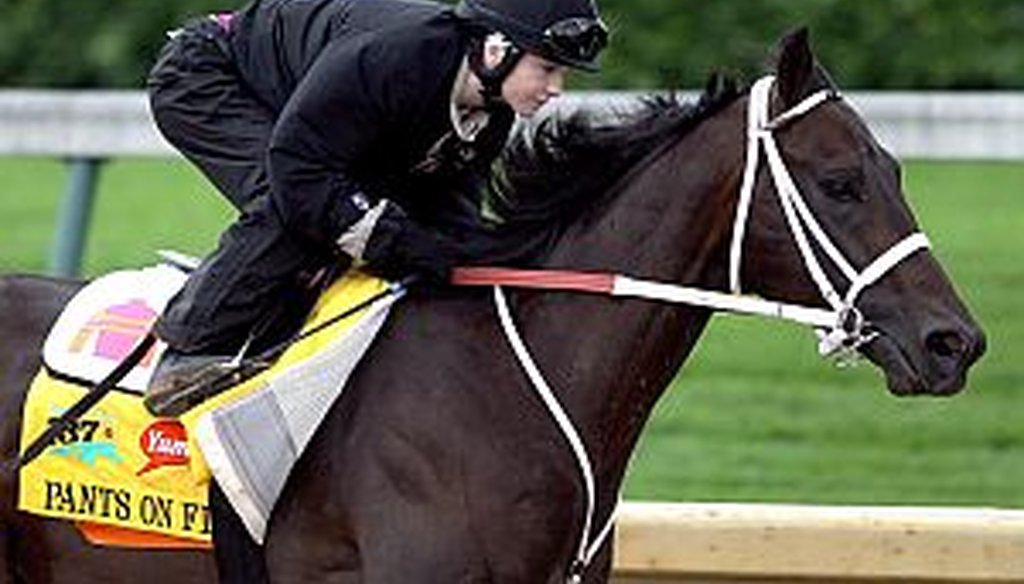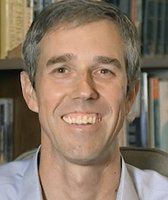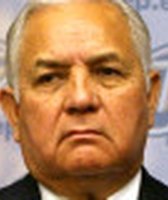Stand up for the facts!
Our only agenda is to publish the truth so you can be an informed participant in democracy.
We need your help.
I would like to contribute

Pants on Fire finished this year's Kentucky Derby. True.
Two legislators’ statements singed the Truth-O-Meter last week, while Texas U.S. Rep. Ron Paul pushed the needle per two economic indicators.
The Flashback:
In the first GOP pre-2012 presidential debate, Paul said May 5: "My theory is that people vote from their bellies because it’s whether they’re hungry or not or have jobs and need things, that’s why people vote," Paul said. "And we’re in big trouble. Prices are going up, unemployment is continuing to go up."
In our fact check of the erstwhile presidential candidate about two weeks after he announced he’s explorator-ing a re-bid, the price inflation part of Paul’s claim held up. But the night he spoke, unemployment had dropped steadily for four of the previous five months. Half True.
To flames...
State Rep. Rick Hardcastle brushed off a colleague’s concerns about benzene emissions near Texas schools. "Are you aware benzene is also a compound in soap?" Hardcastle said in House debate April 28. "Found at every car wash in this state — and several other industries in this state? And it’s never been proven to be harmful."
Primer: Benzene is an organic chemical compound found most often in the air as a result of emissions from burning coal and oil, drilling for natural gas or in gasoline vapors, car exhaust, cigarette smoke and other sources. It’s also used as a solvent and de-greasing agent in detergents.
Among sources we checked, the Environmental Protection Agency said chronic exposure to benzene for a year or more has caused blood disorders, including reduced numbers of red blood cells and aplastic anemia — a risk factor for developing leukemia. Short-term exposure may cause drowsiness, dizziness, headaches, eye, skin and respiratory tract irritation, and, at high levels, unconsciousness, the agency says. An EPA spokesman said the agency classified benzene as a "human carcinogen and hazardous air pollutant" in 1986.
To claim that airborne benzene has not been proven harmful flies in the face of scientific evidence to the contrary. Pants on Fire.
State Sen. Troy Fraser, pitching his legislation to elect board members for the Pedernales Electric Cooperative from regional single-member districts, noted the expense of seeking election via at-large balloting by the co-op’s entire membership. Fraser told the Senate Committee on Business & Commerce on April 19: "If you’re a person that lives, let’s say, in Marble Falls and you want to run, you’ve got to... solicit the support of 210,000 people, probably costing in excess of $300,000 to run for a co-op board, which is a little absurd."
Turns out Fraser’s cost estimate was absurd. Not one of the 2010 board candidates we reached acknowledged spending even $5,000 on their campaigns, with most saying they spent less. Pants on Fire.
State Sen. Steve Ogden, replying to a Democratic colleague in floor debate May 3, said Gov. Rick Perry has previously "advocated to liquidate" the state’s rainy day fund. He added that Perry did so four years ago.
Ogden declined to elaborate; his office said he was reflecting on Perry’s desire in 2007 to deliver tax rebates to residents. We found no sign of Perry advocating emptying the fund to do that. Then Perry himself told reporters he had pushed for liquidation in 2005. We rated Ogden’s recap Half True.
Dick Armey, the Texas U.S. House majority leader turned FreedomWorks’ chairman, wrote in the April 17 Houston Chronicle: "At Texas A&M University, only 49 out of 3,000 faculty members brought in enough money to pay for their salaries and overhead over the past five years."
Armey’s outfit did not provide a detailed methodology to back up those figures. Separately, we looked over a Texas A&M University System analysis released in September, identifying more than 49 faculty members in just a sampling of academic departments who brought in more money than they cost. We rated Armey’s statement False.
With Austin City Council elections in full swing, we checked statements by competing candidates for Place 3 on the council.
Kathie Tovo, drawing a bead on Place 3 incumbent Randi Shade, says in mailers to voters that one of Shade’s biggest contributors is the lobbyist for the Formula One racetrack planned southeast of Austin.
The lobbyist, lawyer Richard Suttle, has personally given Shade’s campaign only $25, the maximum any lobbyist working City Hall can give per election. However, lawyers and spouses connected to the Armbrust & Brown firm, where Suttle is a partner, accounted for 51 firm-connected contributions for a total $15,900 from late December through April 4, Tovo’s campaign pointed out. Taken together, their contributions accounted for 9 percent of her support at that point.
We rated Tovo’s statement Barely True.
Former Council Member Max Nofziger is quoted in the May 1 "Voters Guide" from the League of Women Voters of the Austin Area: "Currently, there is no one from South Austin on the (Austin City) Council!"
True, though South Austinites were on the council as recently as 2008.
See anything questionable in your political mail? Fire at us by [email protected] join us on Facebook and Twitter.
Our Sources
PolitiFact Texas articles.







































